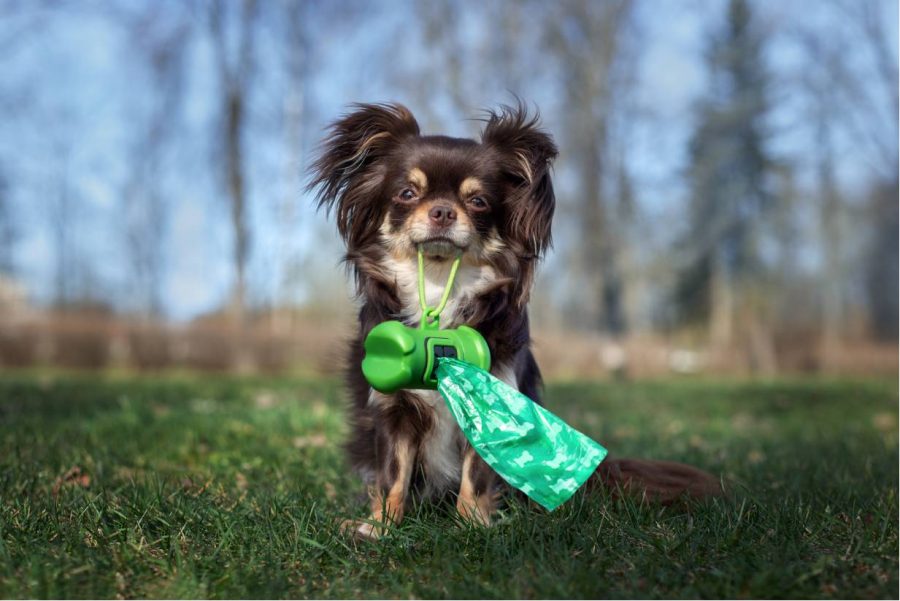
Have you ever seen your dog consuming a fresh pile of poop? The sight and especially the smell arouse in your pet an excitement worthy of a 3-star meal that you can’t seem to restrain. Canine custom, behavior disorder, or health problem, hypotheses abound to understand the origins of coprophagia in dogs.
Sniffing each other’s butts to say hello and understand who the other dog is, spinning around several times before lying down, sniffing the scents left by other animals, it is certain that the codes of the canine world are very different from those of humans. Although most owners allow their animal to adopt these natural behaviors, the same does not apply to the tasting of all kinds of excrement. How can this behavior be explained? How to react? Here are some clues that should enlighten you.
An inheritance from wolves
There are many hypotheses to try to explain the consumption of feces by dogs. Among them, there is a potential inheritance from wolves who, to avoid the presence of fecal intestinal parasites in their den, got rid of feces by eating them (feces less than 2 days old). A simple and effective technique that, despite the thousands of years of domestication separating the dog from the wolf, would continue with some of our four-legged companions, to the great despair of their owners.
A health problem
Some studies have shown that dogs with pancreatic insufficiency (insufficient production of digestive enzymes) consume feces. In this disease, coprophagia is not the only symptom, diarrhea or weight loss is also observed. In this case, prompt management by your veterinarian is required.
Other pathologies can also be the cause of coprophagia, such as intense digestive parasitism or even digestive disorders (e.g., gastritis). In case of doubt, it is important to seek advice from your veterinarian.
Undernutrition, a diet too rich in starch, and deficiencies are sometimes mentioned as causes of coprophagia, however, there is currently no scientific evidence.
A racial predisposition for gluttony
It seems that some breeds are more likely to enjoy fecal dishes than others. Studies thus show that terriers and hunting dogs are overrepresented (e.g., basset hound, beagle). The poodle, Shetland shepherd, and other small breeds such as the Shih Tzu, Lhasa Apso, Pekingese, and Cocker are also mentioned.
Large breeds, on the other hand, are not to be outdone, especially those prone to digestive problems!
The temperament
Although studies are far from having elucidated the coprophagic dog case, a recurring personality trait is greediness. In other words, greedy dogs are more likely to express this type of behavior. So, be wary of Labrador or Beagle owners (once again!).

Stress, boredom
We know that the lack of stimulation in daily life is at the origin of many behavioral disorders. Because, in the absence of being able to play and take daily walks essential to their well-being, some dogs focus on destroying furniture or sometimes on consuming feces as soon as the opportunity arises. Each has their own technique to occupy themselves.
The risks
The disgust caused by a dog’s consumption of feces is far greater than the risks it poses to the animal. Indeed, even though this behavior may seem repulsive, it has never been demonstrated that the consumption of feces by dogs represents any danger to their health.
Solutions
If medical causes have been ruled out and you cannot bring yourself to let your dog eat feces, here are some tips to dissuade them:
Walks and toys
If it is due to a lack of stimulation, it is important to implement daily activities for your pet to expend enough physical and mental energy. Make sure to provide them with three daily walks during which they can smell new scents, meet other dogs, run, etc. Install bowls and educational toys to keep them mentally occupied during your absences.

Avoid the situation from arising
Do not let your dog go alone in the yard as you will not be able to monitor them. Also, for their well-being, an outing is defined as a walk outside the yard (the yard being just an extension of your home), so it is essential to offer them beautiful walks. If your dog consumes your cat’s feces, make sure to clean the litter box after each use or make it inaccessible for your dog. But be careful, the box must always remain easily accessible for your cat, otherwise, problems of house soiling may arise!
Education tips
Distract their attention. With a ball, a toy they enjoy, or even a treat, you must capture your pet’s attention. The goal is to offer them something more interesting (from their point of view) than what they are about to do.
Zucchini and pineapple
Adding zucchini or pineapple to their diet. There is no scientific evidence regarding the effectiveness of fruits and vegetables in resolving coprophagia problems. Nevertheless, these foods do not represent a danger to your dog (if given in reasonable quantities), so why not try?
No punishment
Do not forget that any punishment is to be avoided. Although it may be repulsive to humans, coprophagia remains a natural behavior for a dog. Whatever the cause, your dog is acting with their canine reflexes. Any punishment would only worsen the situation, degrading the relationship you have with them in the process.
Sources:
https://library.wur.nl/WebQuery/wurpubs/fulltext/43992
https://www.ncbi.nlm.nih.gov/pmc/articles/PMC5980124/
This article may interest you: What are the toxic foods for dogs?
